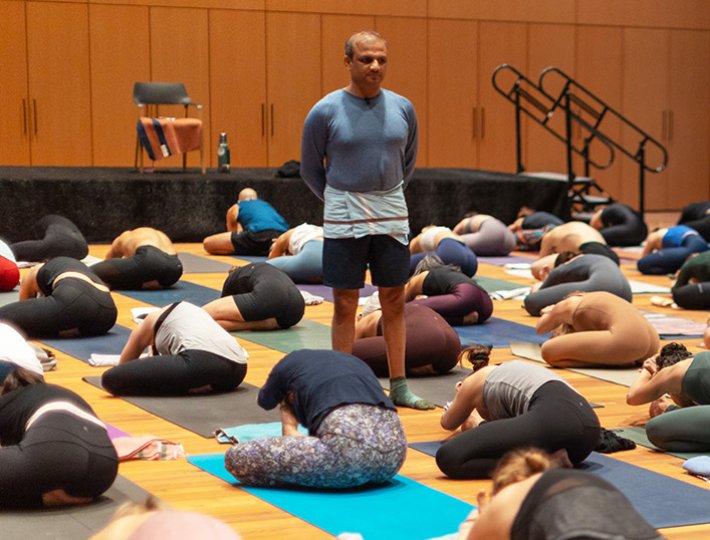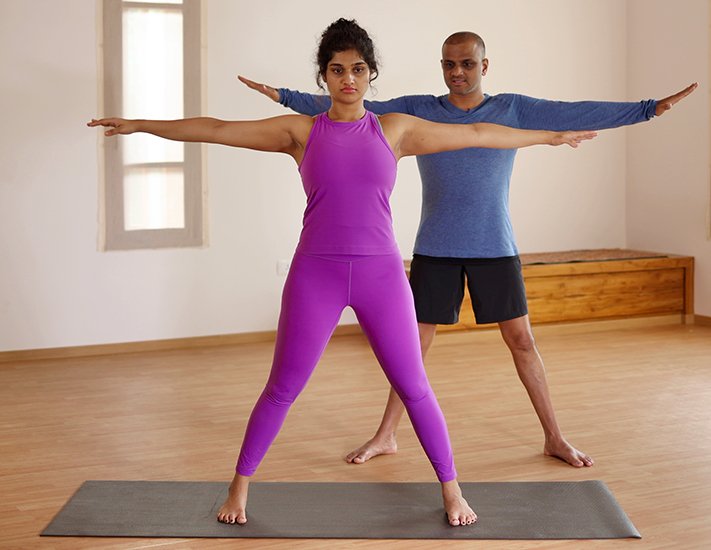Like many other people, I learned to meditate with my eyes closed. This is neither unusual nor remarkable. Many of us come to the cushion with eyes closed, legs crossed, and fingers pointed toward the sky. Many of us come ready to sit slightly more still, back upright, shoulders squared, and breaths slightly measured. Most of us come with an agenda that we quickly render useless: we want to feel better, to be better, to do better. Maybe we read that Oprah meditates, and figured it couldn’t hurt. None of these reasons are wrong. There are many ways to bring awareness inward. There are many ways to be more awake in the world.
Over and over, I learn and relearn that all moments are meditative moments. While I don’t come close to seizing every opportunity, those minutes of mindfulness practice spill into daily interactions. We learn to inhale into stressful situations; we learn to exhale when we’d prefer to shut down.
About a year ago, I enrolled in The Institute for Compassionate Leadership, and was given a meditation instruction that involved practicing with open eyes. I found this challenging. I’d gaze at a fixed point and allow my eyes to soften, but my mind, given a slightly longer leash, would swirl with insights and observations. Suddenly, there were things to see. There was one less barrier between my center and the world. This meditation change became an allegory for my leadership training as I began, with open eyes and good intentions, to ponder using my personal power in productive ways while being compassionately awake to my own role in societal problems (such as: my enormous carbon footprint and my addiction to trash TV). I was learning to live mindfully in the chaos. I was practicing the art of staying awake when it’s hard. In trying (and often failing) to meditate with open eyes, I began to live more fully in the world.
The holiday season is here again, and we’re decking our halls and lighting menorahs. There are so many things to see when our eyes are open. Some of us are drinking too much at holiday parties, and others are raging against the commercialization of religious days. Some of us, who don’t identify as Judeo-Christian, are locked out of the season all together. Millions among us are booking overpriced tickets, so we can venture to cities where families reside. We’re preparing for those long car trips back to the places we grew up, and some of us are buying gifts we can’t really afford. Some of us will spend our holidays with new members of our tribe, while others will spend the season grieving those they’ve lost. We’re all very aware of what we have, and we’re equally aware of what we don’t.
This is our opportunity to practice. This is our opportunity to breathe.
Sometimes, it feels like ‘holiday cheer’ will destroy us as, at the dinner table or near the fireplace, our families interact with outdated versions of who we are. Our dad asks if we’re ever going to finish graduate school. Our mom writes in the holiday newsletter that that she’s “still not a grandma yet.” Our aging aunts speak directly to the 14-year-old girl who quit cheerleading because she couldn’t cartwheel, or the 17-year-old boy who couldn’t find a date to prom. Grandma compares us to our well-adjusted sibling. While our Uncle Matthew, the detective, pulls us aside to discuss the protest selfies we posted on Facebook last week. Mariah Carey’s high notes seep from our parents’ speakers, as our sister’s new boyfriend pours his fourth glass of merlot, and starts loudly expressing his misogynistic views. We want to walk outside, but we suddenly remember that elderly next door neighbor thinks we’ve given up on Christ. The last time we ventured out, she pushed her tattered Bible into our grocery bag. The weight of the book crushed our fresh rye bread.
These are opportunities to practice. These are opportunities to breathe.
These pressure-cooker moments, these family-bonding moments, are the ones for which our open-eyed meditation prepares us. Meditation is less challenging than life. It is easy to close our eyes and our hearts to our loved ones. It is very tempting to build walls—to decide that our thoughts are superior to the thoughts our loved ones have. It’s enticing to judge our elders in all of the same ways we think that they judge us, but, when we practice with open eyes, we understand that all thoughts are equally useless. We relax our ideas of who we think we are, and soften our judgment of others, even if they are not willing to do the same. We breathe. We breathe deeply. We breathe once again. We connect to that ever-flowing stream of energy inside, and, without withdrawing, we nourish ourselves. And when we’re nourished, we know how to proceed.
People, even those who love us most, have a tendency to ignore the person we’ve become in favor of whoever they remember us to be. If we breathe deeply into these moments when someone says something unkind, we find the ever-expanding space between who we think we are and who they think we are. In that secret space there is grace. In that space, everything is possible.
Both in our families and in our streets, in our cities and in our homes, there is an overwhelming hunger to be seen as we really are. Whether we dress up like Santa or storm the streets with signs; whether we gather with family members or avoid them like the plague, we’re all searching for a place where we can experience ourselves as loved. We’re all looking for our seat at a table where we can be both imperfect and worthy. May you can find respite in the chaos, by simply remembering to keep your eyes and your heart wide open. May you journey through this season knowing, above all, you are loved.









Comments (0)